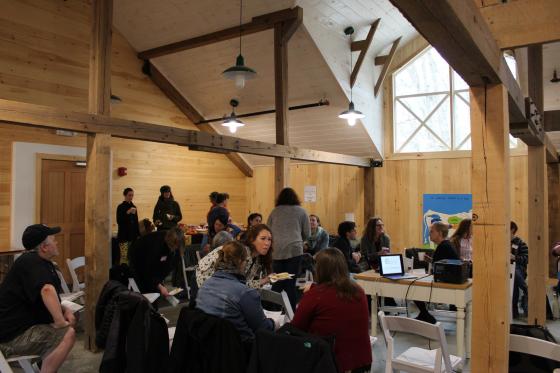Posted May 15, 2019 at 10:48am by Laura Carbonneau
Working With Food And Trauma

[BRATTLEBORO, VT] On an early spring day in mid-April, leaders from seven community organizations came together to explore the question of how traumatic life experiences (and even the experiences of our ancestors) shape the way we eat. Guided by gifted trainers Kendra Colburn, Deb Witkus, and Angela Berkfield from Equity Solutions, staff from the Vermont Foodbank, Groundworks Collaborative, Food Connects, Brattleboro Food Co-op, Retreat Farm, Putney Foodshelf, and Pathways Vermont gathered together in the community room at the Retreat Farm for a day of learning about the connection between trauma and eating.
The goals of the training were:
-
Learn about trauma and how it can impact people’s relationship to food
-
Practice telling our own stories related to trauma and food
-
Interrupt related biases and assumptions that are getting in the way of connecting with people
-
Apply trauma-informed practice to our life and work
At the beginning of the training, each of the trainers shared their own food stories and created space for all participants to share food stories with each other as a way to practice vulnerability. Participants were also invited to contribute to a potluck lunch and to share with each other the values and beliefs that were connected to the food that they brought. After lunch, organizations were introduced to the Substance Abuse and Mental Health Services Administration’s (SAMHSA’s) 6 Core Trauma-Informed Practices, and working groups were formed to apply these practices to our work and to set goals.
The training was sponsored by the Vermont Foodbank, Groundworks Collaborative, and Food Connects—three organizations in the community that are actively engaged in conversations about becoming more trauma-informed in their approaches.
Food Connects was the lead organizer of the event, and is the recipient of a 2-year grant from the Thompson Trust to support Trauma-Informed initiatives in the Brattleboro Town Schools, with a focus on the ways that Farm to School programming can support resiliency for students and families who have experienced trauma. Food Connects’ next step will be using SAMHSA's 6 Principles to a trauma-informed approach for an internal assessment, and based on that assessment staff will determine what actions make sense as Food Connects supports the Brattleboro Town Schools in their resiliency work.
The Trauma and Food training was one piece of the work that the Vermont Foodbank is undertaking towards becoming trauma-informed. The Foodbank hosted their annual Hunger Action Conference in early May with a focus on “Healing the Past.” The keynote speaker, Dr. Ken Epstein, gave a series of workshops throughout the day on trauma. Additionally, the Foodbank’s Community Impact Team hosted a daylong team retreat in early May to continue conversations and build on the action steps that came out of the Trauma and Food training.
At Groundworks Collaborative, food shelf staff met with residents at Great River Terrace and Groundworks shelter to gain insight from folks with lived experience on the food shelf intake process, hours of operation, and the physical layout, with the goal of gaining an understanding of why people may not feel comfortable using the food shelf and ways to make the space less stigmatizing and more inviting. Additionally, staff met with current volunteers to discuss ideas on how to implement each of the six principles of trauma-informed care. As the food shelf moves into a new space in the coming months, Groundworks hopes to use this as an opportunity to incorporate a trauma-informed lens in all decision-making processes.
Equity Solutions supported the training participants in gaining confidence in their ability to interrupt long-held biases, recognize the impact that systems have on individual outcomes, and take action for equity in their communities. Trainers encouraged the group to consider their own food stories and find the courage to share those with others. According to a post-training assessment, attendees demonstrated an increased understanding of what it means to be vulnerable and share stories with others.
After the training, one of the participants stated, “This training will dramatically impact how I approach my work, especially in the coming year with taking action on incorporating lived experience and figuring out how to walk with people in relational ways.”
Another participant said that they, “Loved that facilitators did not shy away from naming things people often talk around in ‘professional’ trainings—i.e. oppression, capitalism, power structures.”
Becoming a Trauma-Informed Community will require schools, community organizations, and town leadership to work together to change systems to better meet the needs of people in our community, and this training was one piece of the rewarding, challenging, powerful work that it will take to transform our community and make it a better place for all people.
Equity Solutions provides engaging and innovative trainings and consulting services for state agencies, social service organizations, schools, and businesses so participants gain tools for strong client, staff, and leadership/management relationships. These strong relationships create a work environment where all are valued and thriving, and can actively contribute to a collective response to root causes of economic and racial inequity.
Food Connects is an entrepreneurial non-profit that delivers locally produced food as well as educational and consulting services aimed at transforming local food systems. The Food Hub aggregates and delivers from over 60 local farms and food producers to over 120 buyers in southeast Vermont, southwest New Hampshire, and western Massachusetts. Our educational services focus on a Farm to School program. Acknowledged as a statewide leader, the program supports over 30 schools to increase local food purchasing, school meal participation, and food, farm, and nutrition education. Together these core programs contribute to a vibrant local economy by increasing local food purchases by schools and improving students’ nutrition and academic performance. Additionally, Food Connects is frequently hired to provide leadership and consulting services for efforts aimed at transforming local food systems in the New England region.
